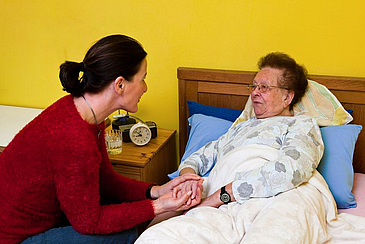The report analyzes the health conditions and strain or burden of the work felt by main caregivers. In addition, it examines the effects of the most recent German care reform act on the care of those receiving it. The authors of the report are Professor Heinz Rothgang and Dr. Rolf Müller. The study’s key data comes from care statistics (2015), routine data from BARMER, and a survey of 1,862 persons insured by BARMER carried out specifically for this topic.
Two Thirds of Caregivers Are Women
In December 2017, around 2.5 million people in need of long-care were nursed by a main caregiver. Two thirds of them were women, and one third men. Only one third of the caregivers from the 2018 BARMER survey of insured persons stated that they were currently gainfully employed. However, a quarter said that they had reduced or given up gainful employment because of their situation as a caregiver.
Support Is Often Insufficient
The main caregiver usually performs several tasks such as administrating medication, helping during mealtimes or toilet visits, as well as supporting mobility in general. Six out of ten main caregivers would appreciate further assistance in at least one of the 11 areas of responsibility included in the survey. In addition to these general needs, finding substitute caregivers is also a further problem. Well over 50 percent of the main caregivers have no way of finding someone to replace them for one or more weeks, which would allow them to take a break. Alternative offers often cannot be resorted to because of high costs, presumed low quality, a lack of offers, or high organizational expenditure. Undoubtedly, there is a clear need here – but one that cannot be satisfied due to problems relating to the supply of options for caregivers or to the expenditure of help.
Caught in the Role of Caregiver
Of the main caregivers, 87.5 percent say that they are mostly or always able to manage their role as a caregiver. Nevertheless, a large part of them do not get enough sleep (38 percent) and 29.9 percent of the main caregivers actually feel trapped in their role. Every fifth person (20.4 percent) often finds caregiving too strenuous. In 22.7 percent of the cases, long-term care ends up having a negative effect on friendships. One in five (18.8 percent) feel anxious about the future and their existence.
Those providing care to relatives are not only sicker, but they also become more ill through the process of providing care. Psychological disorders are very common among main caregivers (48.7 percent in December 2017). In a comparison group not structurally identical in terms of age and sex, only 42.5 percent have such diagnoses. Over the past five years, the morbidity rate among main caregivers has increased by 9.1 percentage points yet only by 5.7 percentage points for the comparison group.
Future Scenarios of the Caregivers
A total of at least 185,000 main caregivers, who are on the verge of discontinuing their provision of care, can be extrapolated from the 2018 BARMER survey of insured persons. Another over one million main caregivers only wish to continue providing care as long as the situation does not change. However, since the caregiving situation often tends to deteriorate over time, it cannot be assumed that this group will continue with their provision of care. The authors see this as “an ominous starting point.”
Desire for Less Bureaucracy
Main caregivers would like to see less bureaucracy with regard to applications, would preferably like to contact the same specialist every time they have questions, and would also appreciate receiving better information about the benefits of long-term care insurance and where to get help. “This shows a need for action on the part of the central players in the area of caregiving and of politics,” the authors sum up.
Contact:
Professor Heinz Rothgang
SOCIUM – Research Center on Inequality and Social Policy
University of Bremen
Tel.: +49 421 218-58557
E-mail: rothgang@uni-bremen.de
Dr. Rolf Müller
Tel.: +49 421 218-58554
E-mail: rmint@uni-bremen.de

